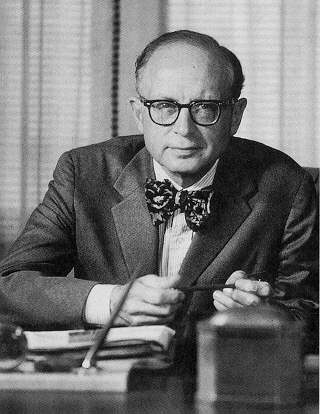Daniel Boorstin citáty a výroky
„Píšem, aby som zistil o čom rozmýšľam. Okrem toho bary nie sú otvorené tak skoro.“
I write to discover what I think. After all, the bars aren't open that early.
Wall Street Journal, 31 December 1985
na otázku prečo píše doma od 6:30 do 8:30 ráno
Potvrdené výroky
Varianta: Píšem, aby som zistil o čom rozmýšľam. Okrem toho bary nie sú otvorené tak skoro.
Daniel Boorstin: Citáty v angličtine
Zdroj: The Image: A Guide to Pseudo-Events in America (1961), p. 37.
“We suffer primarily not from our vices or our weaknesses, but from our illusions.”
Preface
The Image: A Guide to Pseudo-Events in America (1961)
Kontext: We suffer primarily not from our vices or our weaknesses, but from our illusions. We are haunted, not by reality, but by those images we have put in their place.
The Creators: A History of Heroes of the Imagination (1992) (Vintage edition, 1993, ), Preface, p. XV.
Kontext: These creators, makers of the new, can never become obsolete, for in the arts there is no correct answer. The story of discoverers could be told in simple chronological order, since the latest science replaces what went before. But the arts are another story — a story of infinite addition. We must find order in the random flexings of the imagination.
“Education is learning what you didn't even know you didn't know.”
A Case of Hypochondria, Newsweek (6 July 1970).
Zdroj: The Lost World of Thomas Jefferson (1948), Ch. 4, part 6: The American Destiny, p. 229.
As quoted by Barbara Gamarekian in Working Profile: Daniel J. Boorstin. Helping the Library of Congress Fulfill Its Mission http://www.nytimes.com/books/98/09/06/specials/boorstin-working.html, The New York Times (July 8, 1983).
Introduction, part 2: The Influence of America on the Mind, p. 6.
The Lost World of Thomas Jefferson (1948)
Zdroj: The Image: A Guide to Pseudo-Events in America (1961), p. 261.
Zdroj: The Lost World of Thomas Jefferson (1948), Ch. 3, Part 2: The Happy Variety of Minds, p. 125.
Zdroj: The Image: A Guide to Pseudo-Events in America (1961), p. 44.
Zdroj: The Republic of Technology (1978), p. 38.
This "aphorism" was expressed in different forms by Josh Billings and Socrates. note: Often misquoted as, "The greatest enemy of knowledge is not ignorance, it is the illusion of knowledge," and often misattributed to Stephen Hawking.
Zdroj: Cleopatra's Nose: Essays on the Unexpected (1995).
Zdroj: The Image: A Guide to Pseudo-Events in America (1961), p. 257.
The Americans: The Democratic Experience (1973), as cited in: Robert J. Gordon (2016), The Rise and Fall of American Growth, p. 1.
Zdroj: The Image: A Guide to Pseudo-Events in America (1961), p. 245.
Zdroj: The Image: A Guide to Pseudo-Events in America (1961), p. 33.
Zdroj: The Image: A Guide to Pseudo-Events in America (1961), p. 31.
Zdroj: The Image: A Guide to Pseudo-Events in America (1961), p. 12.
Zdroj: The Image: A Guide to Pseudo-Events in America (1961), p. 213.
Zdroj: The Lost World of Thomas Jefferson (1948), Ch. 3, The Physiology of Thought and Morals, Introduction, p. 111.
“Some are born great, some achieve greatness, and some hire public relations officers.”
As quoted in Book of Humorous Quotations (1998), by Connie Robertson, p. 29.
Foreword to America and the image of Europe: Reflections on American Thought, Meridian Books, 1960, as cited in: Robert Andrews (1993) The Columbia Dictionary of Quotations https://books.google.com/books?id=4cl5c4T9LWkC&lpg=PA207&dq=Our%20attitude%20toward%20our%20own%20culture%20has%20recently%20been%20characterized%20by%20two%20qualities%2C%20braggadocio%20and%20petulance.&pg=PA207#v=onepage&q&f=false, Columbia University Press, p. 207.
“I write to discover what I think. After all, the bars aren't open that early.”
As quoted in Wall Street Journal (31 December 1985) on why he did his writing at home very early in the morning while he served as the Librarian of Congress.
Zdroj: The Lost World of Thomas Jefferson (1948), Ch. 1, part 2: The Economy of Nature, p. 41.
“A celebrity is a person who is known for his well-knownness.”
Zdroj: The Image: A Guide to Pseudo-Events in America (1961), p. 57.
Notes, p. 262.
The Lost World of Thomas Jefferson (1948)
